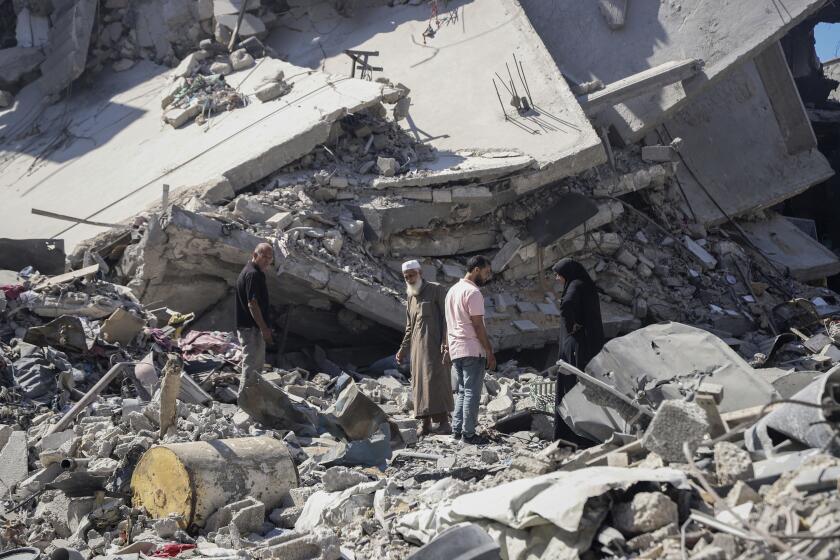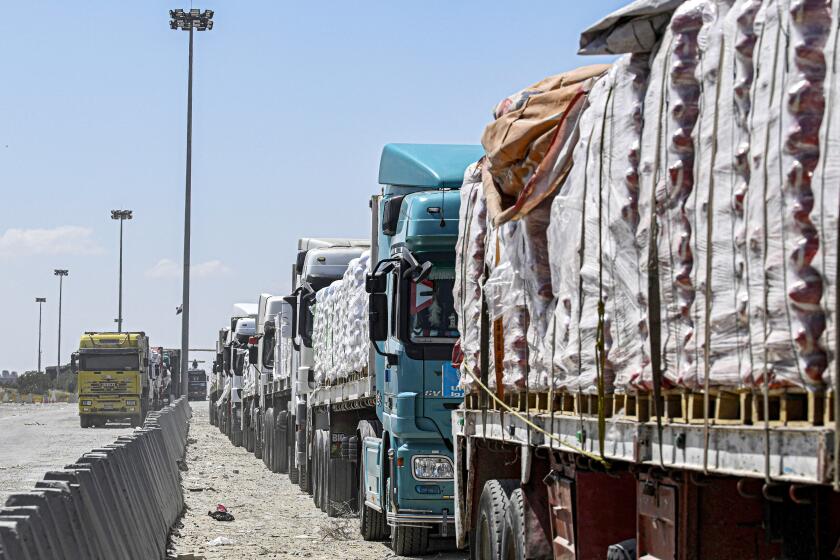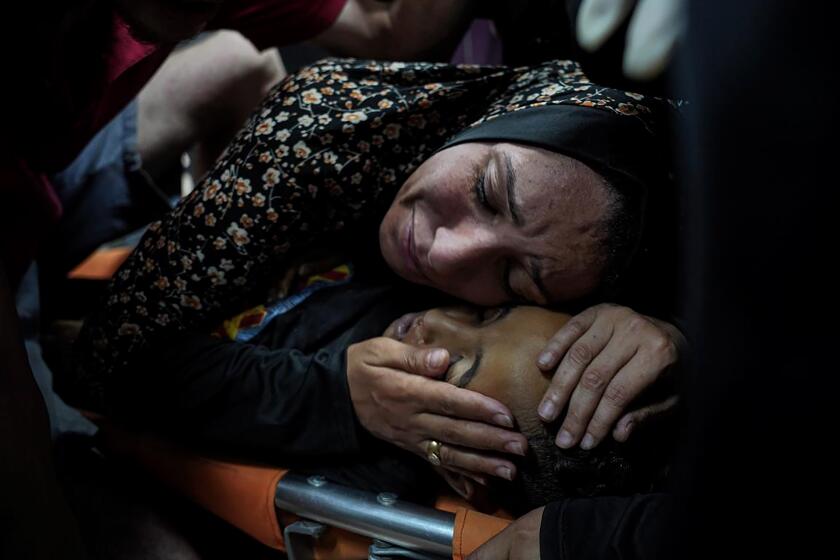U.S. launches lobbying blitz to sell Gaza cease-fire plan to Hamas through Arab and Muslim nations

- Share via
WASHINGTON — The Biden administration has launched an intense drive to persuade Hamas and Israel to accept a new cease-fire proposal in the nearly eight-month-old war in Gaza while it also presses Arab nations to get the militant group to go along with the terms.
It comes as President Biden suggested in a Time magazine interview published Tuesday that Israeli Prime Minister Benjamin Netanyahu may be prolonging the war against Hamas to ensure his political survival. Biden, who gave that interview a week ago, seemed to dial back his criticism in a brief exchange with reporters following an immigration speech at the White House.
In response to a question about whether Netanyahu is playing politics with the war, Biden said: “I don’t think so. He’s trying to work out the serious problem he has.”
Netanyahu faces a far-right coalition that has threatened to break up his government if the prime minister agrees to a new cease-fire proposal, which Biden announced Friday as an Israeli plan. Since then, Biden and his top aides have not only pressed for Israel and Hamas to approve the deal but also have been working the phones with Arab and Muslim nations.
Biden, Secretary of State Antony J. Blinken and national security advisor Jake Sullivan have all made calls, and Brett McGurk, the White House coordinator for the Middle East and North Africa, will be heading to the region this week to further make the case for the deal. The plan would aim to free remaining Israeli hostages held by Hamas and lead to the withdrawal of Israeli troops from Gaza in phases.
Most postwar plans floated by diplomats and world leaders seem doomed to fail. Here’s a look at the leading ideas for what to do with the Gaza Strip.
Since Friday, Blinken has spoken with the foreign ministers of Turkey, Egypt, Qatar, Saudi Arabia, Jordan, the United Arab Emirates, Morocco and Algeria, according to the State Department. Blinken also spoke over the weekend with Israeli Defense Minister Yoav Gallant and Benny Gantz, another member of Netanyahu’s war Cabinet.
Biden spoke Monday with the emir of Qatar — whose country, along with Egypt, has played a major role in trying to negotiate a truce and persuade Hamas to accept one.
That was followed quickly by a joint statement from the leaders of the Group of 7 advanced democracies calling “on Hamas to accept this deal, that Israel is ready to move forward with, and we urge countries with influence over Hamas to help ensure that it does so.” The G-7 is made up of Britain, Canada, France, Germany, Italy, Japan and the U.S.
Also Monday, Sullivan spoke with his Turkish counterpart about the “urgent need for Hamas to accept Israel’s proposal.”
A Biden administration official said Tuesday that McGurk, who has been shuttling between Washington and Middle East capitals throughout the war for talks with key regional stakeholders, would be returning to the region this week. The official requested anonymity to discuss the yet to be publicly announced travels for McGurk.
Families of Israeli hostages held by Hamas call on all parties to immediately accept a proposal detailed by President Biden to end the war in Gaza.
U.S. officials say Hamas has yet to respond to the proposal that was sent to them Thursday and have bristled at suggestions that Netanyahu is not fully on board. They have stressed repeatedly that the Israelis signed off on sending the proposal to Hamas last week.
But two leading members of Netanyahu’s far-right governing coalition — National Security Minister Itamar Ben-Gvir and Finance Minister Bezalel Smotrich — have threatened to leave Netanyahu’s government if he signs off on the proposal. That would cause the coalition to collapse.
Netanyahu has said there are certain “gaps” in how Biden laid out the proposal and Israel would not agree to a permanent cease-fire until “the destruction of Hamas’ military and governing capabilities, the freeing of all hostages and ensuring that Gaza no longer poses a threat to Israel.”
In the Time interview conducted May 28, three days before he announced the cease-fire proposal, Biden was asked about critics in Israel suggesting that Netanyahu was extending the war for political preservation. Biden initially said he wasn’t going to comment then noted that “there is every reason for people to draw that conclusion.”
White House national security spokesman John F. Kirby told reporters Tuesday that the president’s comments in Time were “referencing what many critics have said. For our part, though, he and Prime Minister Netanyahu do not agree on everything.”
The killing of an Egyptian soldier along the Gaza border poses new risks for an already tense relationship between Israel and Egypt.
But Kirby said the U.S. would keep working with its ally to combat Hamas and get the cease-fire plan approved.
Meanwhile in Gaza on Tuesday, the Israeli military said ground troops backed by airstrikes launched an operation in central Gaza’s Bureij refugee camp. Hospital officials said a strike in the camp killed 11 Palestinians, including three children and a woman.
The extent of the Israeli incursion into the urban refugee camp was not immediately known. The military statement said it was conducting “a precision operation” targeting Hamas positions.
A spokesman for Gaza’s civil defense said first responders recovered the bodies of 360 people, mostly women and children, killed in the urban refugee camp of Jabaliya during a three-week Israeli offensive there.
Satellite photos showed extensive new damage in Jabaliya from the offensive, which ended with Israeli troops pulling out on Friday. The photos — taken by Planet Labs PBC on May 8 before the assault and on June 1 — showed that the camp’s main marketplace had been destroyed and in several places entire blocks had been wiped away.
Egypt issued its strongest objection to the Rafah offensive, saying it will join South Africa’s case at the International Court alleging Israel is committing genocide.
The Israeli military launched the assault on Jabaliya in early May, saying it was targeting Hamas militants who had regrouped there after repeated previous offensives in the densely built district.
Israeli bombardments and ground operations in Gaza have killed more than 36,000 Palestinians, according to the Health Ministry, which does not distinguish between combatants and civilians. Israel’s expanding offensive in the southern Gaza city of Rafah has largely cut off the flow of food, medicine and other supplies to Palestinians who are facing widespread hunger.
Israel launched the war in Gaza after Hamas’ Oct. 7 attack, in which militants stormed into southern Israel, killed some 1,200 people — mostly civilians — and abducted about 250. As many as 100 hostages captured on Oct. 7 are believed to still be alive in Gaza, along with the remains of more than 30 others.
Lee and Madhani write for the Associated Press. AP reporter Seung Min Kim contributed from Washington.
More to Read
Sign up for Essential California
The most important California stories and recommendations in your inbox every morning.
You may occasionally receive promotional content from the Los Angeles Times.














